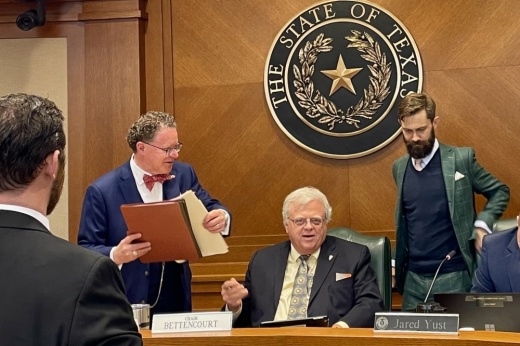Senate Bill 4 would raise tax exemptions on Texans’ primary homes by $40,000. The current homestead exemption is $100,000 for most homeowners, and $110,000 for seniors and people with disabilities.
Following a brief hearing, the bipartisan committee voted 6-0 to send SB 4 and an associated constitutional amendment, Senate Joint Resolution 2, to the full Senate. If approved by both chambers this session, the tax cut would then go to voters in November. The bills are on the Senate’s intent calendar for Feb. 12, according to Texas Legislature Online.
The legislation is a top priority of Lt. Gov. Dan Patrick, who oversees the upper chamber.
What you need to know
Texas had the nation’s seventh-highest average property tax rate in 2022—1.47%—according to the Tax Foundation, a national think tank. Bill author Sen. Paul Bettencourt, R-Houston, said Feb. 11 that the Lone Star State had moved to 10th place due to recent tax cuts by the legislature.
State lawmakers have committed to continue tackling property taxes this year, on the heels of an $18 billion tax relief package they passed in 2023.
Senators have set aside $3 billion to raise the homestead exemption in an initial draft of the 2026-27 state budget. Lawmakers also budgeted $3 billion to continue reducing school district tax rates under legislation passed in 2019.
Gov. Greg Abbott deemed property tax relief an emergency priority in his Feb. 2 State of the State address and urged lawmakers to spend $10 billion on new cuts, though he did not specify how they should do so.
The average Texas homeowner could see nearly $500 in annual savings under the Senate’s tax relief plans, Bettencourt said. This includes $363 from the proposed homestead exemption increase and $133 from reduced school tax rates, according to documents presented during the hearing.
The homestead exemption increase would only apply to taxes charged by public school districts, and would not impact cities, counties or other taxing entities, Bettencourt said.
Texas House leadership had not released their own tax relief legislation as of Feb. 11.
What they’re saying
An increased homestead exemption could help more Texans buy their first homes or feel comfortable moving, said Dixon Holman, an Arlington real estate agent who serves on the Texas Realtors board.
“[A few hundred dollars] can have a very significant impact on decisions when it comes to purchasing a home, [or] deciding whether to purchase a home,” Holman said during the hearing. “That opens up homes for others. Right now, we've got a lot of people that are locked in place and won’t leave.”
The benefits would be particularly significant for older Texans, said Charles Scoma, a member of the Texas Silver-Haired Legislature, which advocates for seniors at the capitol.
“A third of our Texans that are 60 and older, they spend more than 30% of their income on housing and related utilities,” Scoma said Feb. 11. “We found that only 5% of older Texans in 2021 moved, so they're staying in their homes longer. They're in older homes [and] the cost for maintaining those homes increases.”
Under SB 4, 80%-90% of Texans over 65 years old would no longer have to pay property taxes, Scoma estimated.
“These folks have contributed to our community over the years... and we can only do that if we retain our health and if we are able to retain our homestead,” Scoma said. “A lot of seniors now are moving into the homeless category, unfortunately, because of [high] costs.”
Sen. Mayes Middleton, R-Galveston, said the proposal would help ensure Texans can afford to remain in their homes.
“We've all campaigned before, we've all knocked on doors,” Middleton said. “The thing that I heard on the front porch the most is, ‘I'm gonna have to sell my home. I can't afford to pay these property taxes anymore.’ ... We’re doing something about that today.”
The other side
Shannon Halbrook, a fiscal analyst for Every Texan, a progressive think tank, said lawmakers should focus on investments in public education, infrastructure and health care before expanding the homestead exemption.
“We don't want to keep doing more [tax] cuts... but we certainly realize that folks are struggling,” Halbrook said.
If the state is going to cut taxes, a homestead exemption increase is the most equitable method, Halbrook added.
“Increasing the exemption is really felt across the income spectrum, whereas ways like appraisal caps and other methods to cut property taxes really benefit the folks at the top the very most,” he said. “That being said, we would also really like to see something a little bit more targeted to really get the most bang for the buck in terms of tax cuts, like a... renters’ rebate.”
Also of note
Lawmakers should also look into reforming the state’s property tax system, said James Quintero, a policy director for the conservative Texas Public Policy Foundation.
“It's been very clear over the last interim that when the legislature cuts taxes, local governments use that as an opportunity to raise taxes through a combination of aggressive rate increases,” Quintero said.
In 2024, Harris County commissioners increased tax rates for the county, the local hospital district and the Port of Houston Authority. Abbott and Bettencourt have vowed to close “loopholes” that allow local governments to raise taxes after the legislature approves cuts.
Abbott has said lawmakers should pass legislation preventing taxing entities from raising property tax rates without approval from two-thirds of local voters.
“We’ll be dealing with those issues later,” Bettencourt said Feb. 11.





